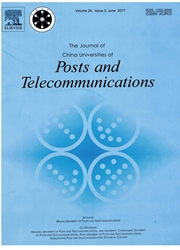

 中文摘要:
中文摘要:
因为宽申请和地点知道的服务的大市场潜力,为活动通讯正在被付更多的注意的第四代(4G ) 的无线地点技术的研究。为下一代的无线认知地点(WCL ) 技术无线网络在最近的年里被建议了。当不同方法被采用到措施时,这篇文章调查 WCL 算法的放的精确性的变化短期(SR ) 信息。由首先完成克拉姆 ? 慷瑳獥
 英文摘要:
英文摘要:
Because of the wide application and great market potential of location-aware services, the research of wireless location techniques for the fourth generation (4G) mobile communications is being paid more attention. Wireless cognitive location (WCL) techniques for next generation wireless networks have been proposed in recent years. This article investigates the changes of the positioning accuracy of WCL algorithm when different methods are adopted to measure the short-range (SR) information. By fJrst completing Cramer-Rao lower bound (CRLB) analysis of the WCL algorithm with SR measurements based on time of arrival (TOA) and received signal strength (RSS), it is discovered that TOA-based or time difference of arrival (TDOA) -based SR measurement can make WCL algorithms achieve higher accuracy than RSS mode, which is also verified by numerical simulation in the article. The conclusions can instruct the design of novel WCL-based location algorithms.
 同期刊论文项目
同期刊论文项目
 同项目期刊论文
同项目期刊论文
 期刊信息
期刊信息
